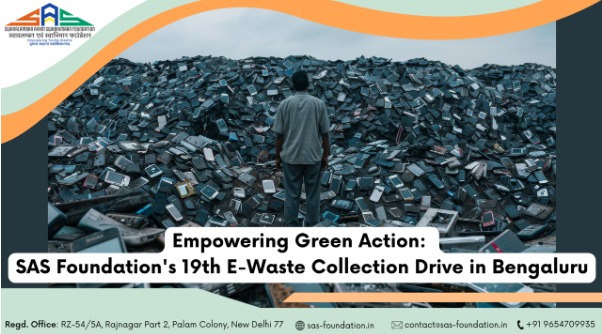Turning Trash into Treasure: Uncovering the Value of E-Waste
What if we told you that your old phone, broken laptop, or that drawer full of tangled cables might contain actual gold, silver, and rare earth elements? It’s true — and more importantly, it’s an opportunity.
In today’s hyper-digital world, we all own electronic gadgets. From smartphones and tablets to desktops, chargers, and smartwatches — these devices are part of our everyday lives. But what happens when they stop working, or when we upgrade to the latest model? Most of the time, they get thrown away, forgotten in drawers, or worse, dumped in landfills.
That’s where e-waste recycling steps in — not just as a waste management solution, but as a way to recover valuable materials, protect our environment, and contribute to a circular economy.
📱💻 The Growing E-Waste Crisis
According to the Global E-Waste Monitor 2024, the world generated over 62 million tonnes of e-waste in a single year — a figure expected to keep rising as technology continues to evolve and devices become more disposable. Yet, less than 20% of this waste is properly recycled.
That means millions of tonnes of electronic devices, many still containing usable resources, end up being burned, dumped, or dismantled informally — causing environmental pollution, health hazards, and huge losses of precious materials.
💡 E-Waste: A Hidden Goldmine
Here’s the surprising part: your electronics are filled with valuable metals.
- Gold is used in connectors, circuit boards, and processors due to its excellent conductivity and resistance to corrosion.
- Silver is found in switches, contacts, and soldering components.
- Copper is used extensively in wiring and internal components.
- Palladium, platinum, and rhodium are often found in hard drives and printed circuit boards.
- Rare earth elements like neodymium, lanthanum, and yttrium are essential for magnets, displays, and batteries.
Just 1 million recycled mobile phones can recover:
- 350 kg of silver
- 34 kg of gold
- 15,000 kg of copper
- 10 kg of palladium
Imagine the potential when recycling happens at scale.
🔄 The Circular Economy in Action
When we recycle electronics responsibly, we’re not just throwing things away — we’re reintroducing valuable materials back into the supply chain, reducing the need for mining, and conserving natural resources.
This process supports a circular economy, where products, materials, and resources are reused, repaired, and recycled rather than wasted. It’s a model that:
- Reduces raw material extraction
- Decreases carbon emissions
- Minimizes pollution
- Promotes sustainability and innovation
In a world facing climate change, biodiversity loss, and resource scarcity, the circular economy is no longer an option — it’s a necessity.
🌍 Environmental & Social Benefits
1. Reduces Pollution
Electronic waste contains harmful substances like lead, mercury, cadmium, and brominated flame retardants. When e-waste is improperly dumped or burned, these toxins leach into soil and water or are released into the air, causing severe environmental and health damage.
Recycling reduces these risks by safely handling, separating, and neutralizing toxic components.
2. Lowers Carbon Footprint
Extracting and processing raw materials like gold and rare earth metals are energy-intensive and carbon-heavy processes. Recycling reduces the need for mining, saving energy and significantly cutting down greenhouse gas emissions.
3. Creates Jobs and Supports Local Economies
Formal e-waste recycling industries create safe, skilled jobs in sorting, dismantling, refurbishment, and logistics. This fosters green employment opportunities and helps build inclusive, circular economies, especially in developing countries.
🔒 Don’t Forget Data Security
While the environmental impact is huge, there’s another critical reason to recycle your electronics responsibly: data protection.
Old laptops, phones, and hard drives can still contain personal data — photos, passwords, banking details, company files — even after deleting files. Improper disposal can lead to data theft, privacy breaches, or identity fraud.
Certified recyclers ensure:
- Secure wiping or destruction of hard drives
- Issuance of data destruction certificates
- Safe processing under global data protection standards
So when you recycle, you’re not just helping the planet — you’re also protecting yourself.
🏭 The Problem with Informal Recycling
In many parts of the world, including India, a large percentage of e-waste is processed by informal workers in unregulated conditions. These workers often:
- Use acid baths to extract gold and metals
- Burn wires to recover copper
- Disassemble without protective equipment
- Suffer long-term health issues from exposure to toxins
Supporting certified recyclers and spreading awareness can shift the tide toward safe, formalized e-waste recycling systems.
🌟 What You Can Do Today
You don’t need to be an expert to make a difference. Here’s how you can be part of the solution:
✔️ 1. Audit Your E-Waste
Check your home or office — chances are you have unused or broken electronics you’ve been meaning to throw out.
✔️ 2. Choose Certified Recyclers
Look for recyclers who are R2-certified, e-Stewards, or recognized by national pollution control boards. Ask about their data destruction practices and environmental safety protocols.
✔️ 3. Participate in Collection Drives
Many NGOs and foundations, like SAS Foundation, organize e-waste collection camps in schools, societies, and corporate offices. Participate, volunteer, or help promote these efforts.
✔️ 4. Educate and Influence Others
Talk to friends, colleagues, and family about e-waste. Share articles. Post on social media. Change starts with awareness.
✔️ 5. Buy Responsibly
Support brands that follow eco-design principles, offer take-back programs, and invest in sustainable packaging. And before upgrading your gadget — ask: Do I really need a new one?
🤝 Join the Movement: A Sustainable Future Starts with Us
At Swavalamban Avam Swabhimaan Foundation (SAS Foundation), we believe that every discarded device is an opportunity — not just to recover valuable metals, but to restore balance between people and the planet.
Through our e-waste awareness programs, school workshops, recycling partnerships, and community events, we’re educating citizens, reducing toxic waste, and building pathways for responsible consumption and production.
Now, with your support — whether as an individual, corporate partner, or CSR contributor — we can take this mission even further.
🧭 Final Thoughts
Your old electronics aren’t worthless — they’re full of value, resources, and impact.
Recycling e-waste is not only about reducing clutter. It’s about:
- Protecting our environment 🌳
- Safeguarding our health 🧑⚕️
- Recovering valuable materials 💎
- Creating sustainable livelihoods 💼
- Powering a circular economy 🔄
So the next time you look at an old mobile phone, don’t just toss it — think gold, think green, think future.










